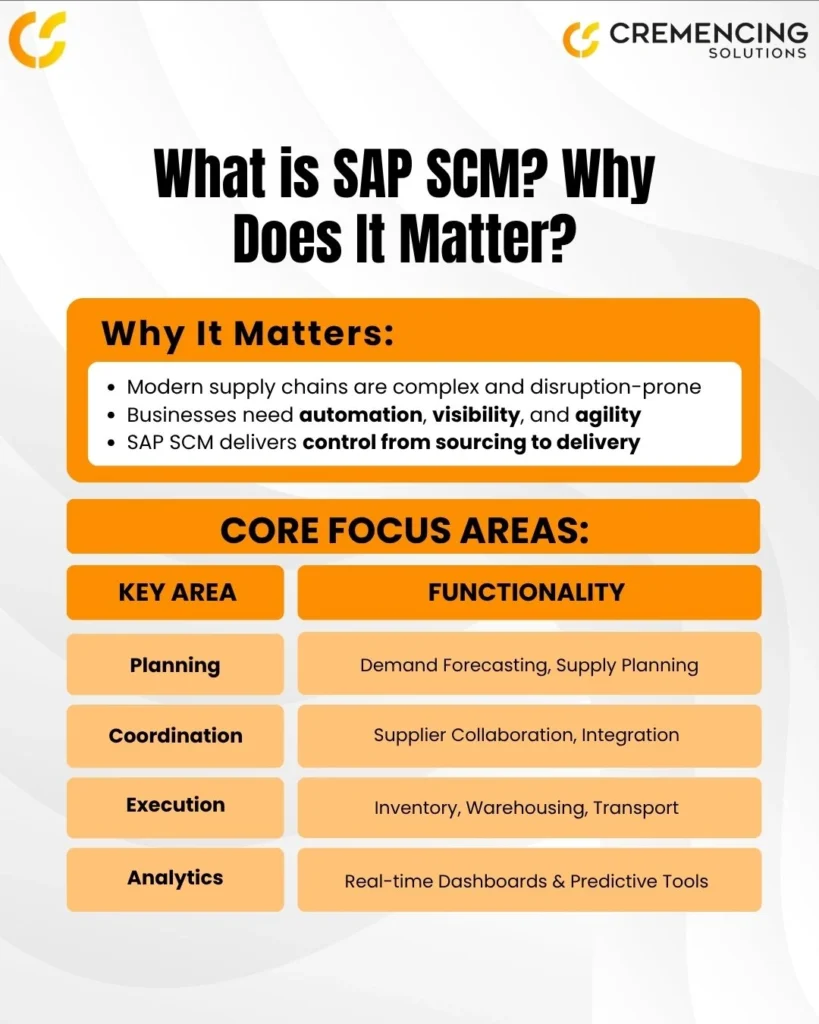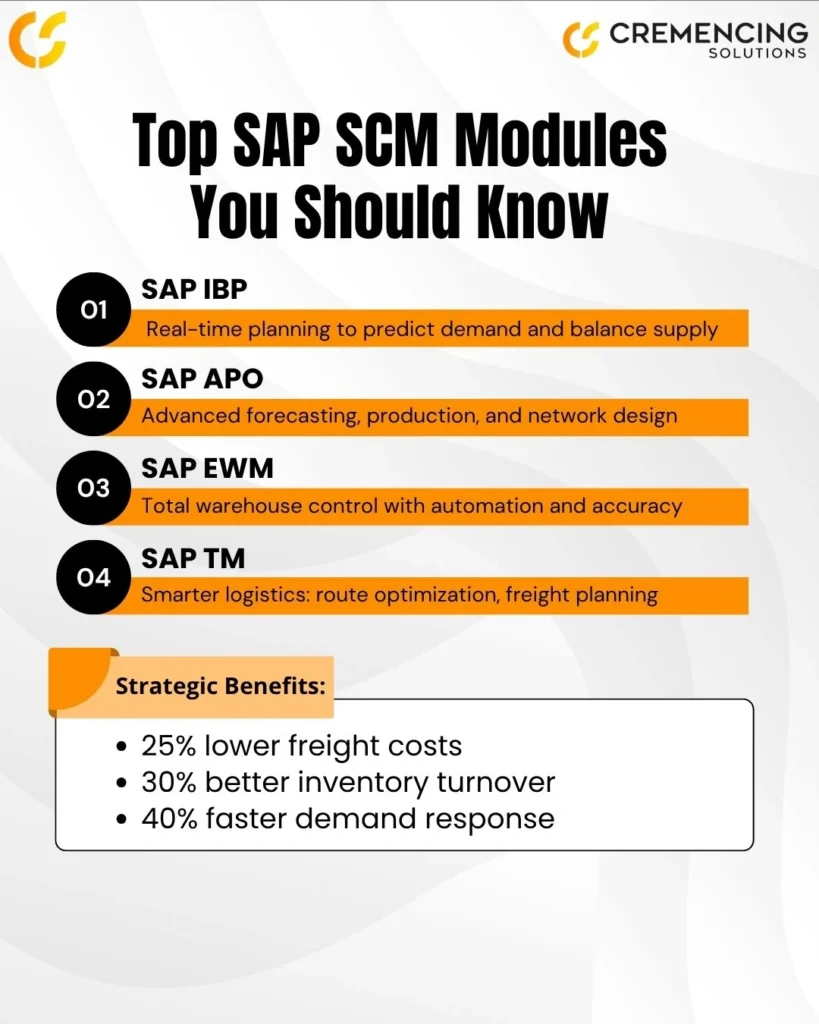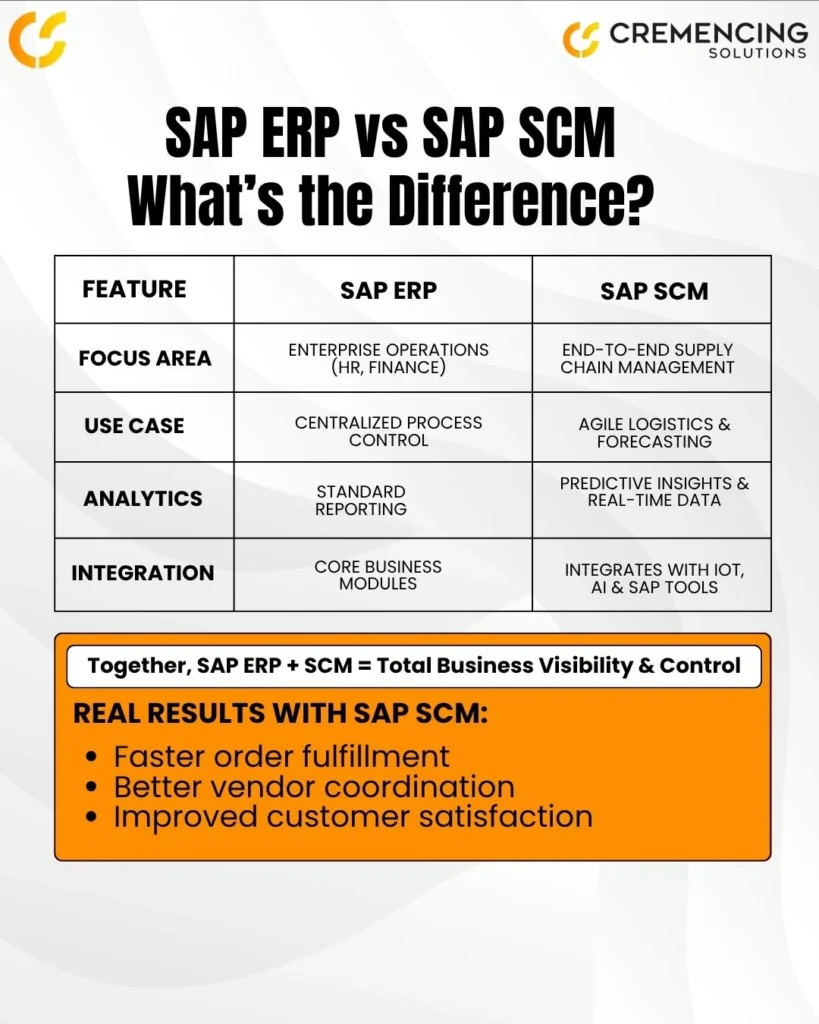SAP for Supply Chain Management: What is SAP SCM & What Can It Do For You
Posted on July 26, 2025 by Laeeq Siddique

SAP SCM is abbreviated for SAP Supply Chain Management – a smart solution created to help companies plan, execute, as well as gain a 360 view over their supply chain process. At Cremencing. We have expertise in building advanced (supply chain management modules) for SAP custom development, and also have the ability to develop custom supply chain management modules.
Why You Should Care:
- Today’s supply chains are complicated and exposed to disruption.
- Efficiency, automation, and immediate insight are what you’d expect.
- Gain visibility, control, and responsiveness across the enterprise with SAP SCM.

SAP for Supply Chain Management Covers:
| Key Area | Functionality |
| Planning | Demand Forecasting, Supply Planning |
| Coordination | Supplier Collaboration, Integrated Processes |
| Execution | Inventory, Warehousing, Transport Optimization |
| Analytics | Real-time Reporting, Predictive Insights |
Core SAP SCM Modules
SAP Integrated Business Planning (IBP) – Cloud-based demand and supply management to synchronize your enterprise and predict market shifts.
Advanced Planning & Optimization (APO) – Provides detailed visibility and insight for strategic forecasting, production planning, and supply network optimization.
Extended Warehouse Management (EWM): With centralized management of warehouse processes, you can efficiently manage inventory and maximize warehouse space.
Transportation Management (TM) – Provides smart freight planning and execution, routing optimization, and cost management for international supply chains.

Advantages of SAP in Supply Chain Management
Why integrate SAP with supply chain management? There are several strategic benefits to integrating SAP within your supply chain:
- Optimized Efficiency: Integrate all aspects of your business, from purchasing to sales.
- Predictive Accuracy: Machine learning aids in predicting dynamic demands.
- Optimization: Automation means less overstock and fewer shipping errors.
- Real-Time Visibility: Dashboards generate visibility across all supply chain sections.
- Compliance with sustainability: Consolidated capabilities monitor and reduce emissions throughout logistics operations.
Industries That Rely on SAP SCM
The adaptable nature of SAP supply chain management ensures it is invaluable regardless of the sector:
- Manufacturing – Lean manufacturing & resource booking
- Automotive – Worldwide parts sourcing and supplier coordination
- Pharmaceuticals – Regulatory compliance and temperature-controlled transportation
- Retail & eCommerce – Omnichannel Store replenishment
- “Quick turn” goods – Sales forecasting and promotions planning for high-volume promotions planning
Latest SAP SCM Innovations (2025 Update)
Keep up with the times with hot new features and innovations:
AI Warehouse Orchestration – Reinforcement learning accelerated operations
SAP Business Network – Real-time collaboration with suppliers and logistics visibility
Digital Twins – Model different scenarios to avoid congestion and control supply chain risk
IoT connectable -Provides predictive maintenance and remote monitoring
Carbon Footprint Insights – Tools for Climate-Friendly Mobility and Documentation
SAP ERP vs SAP Supply Chain Management
| SAP ERP | SAP SCM |
| Core suite managing HR, finance, sales, etc. | Focused exclusively on supply chain operations |
| General-purpose system | Tailored for logistics, planning, forecasting |
| Ideal for centralized control | Designed for agility and execution |
Combining SAP ERP with SAP SCM ensures end-to-end business visibility and better decision-making.
Impact of Supply Chain SAP Software That’s Real
Let’s look at some examples. It’s easy to measure clients who have applied the supply chain management powered by SAP:
- 25% less in transport costs & freight. Combine Images (up to 3)
- 30% increase in inventory turns ratio
- 40% quicker to adapt to changes in supply or demand
Better service-level agreements (SLAs) and improved customer satisfaction

Integration with Other SAP Solutions
SAP SCM integrates seamlessly with:
- SAP S/4HANA for Centralized Business Resource Planning
- • SAP Ariba for purchasing and supplier management
- SAP Analytics Cloud for live reporting and dashboards
These integrations enable companies to become data-driven and to achieve more resilient supply chains.
Conclusion
In today’s ever-more integrated, volatile global economy, getting the most out of your supply chain is critical. SAP for supply chain management is more than just a piece of software; it’s a strategic platform that helps companies create resilient, responsive operations designed for the long term. Powered by machine learning and IoT technologies, and integrated with real-time advanced analytics, SAP SCM can help you get closer to your customers and improve responsiveness while significantly reducing costs.
It doesn’t matter if you’re in manufacturing, retailing, or logistics – by deploying SAP SCM, you can overcome the logistics inefficiencies due to many variables to create strategic advantages and to unlock new opportunities.
Call to Action
If you are intending to streamline your supply chain or want customized features, Cremencing. com is here to help. We are your expert SAP custom development, from implementation to integration and automation.
Contact us today to receive your customized SAP supply chain management consultation:
https://cremencing.com/contact-us/
FAQs
- What is SAP Supply Chain Management SCM?
SAP SCM is a suite that helps manage supply chain processes from planning to delivery. - What is SCM in supply chain management?
SCM means coordinating goods, data, and finances in the supply chain. - What are the four main functions within SAP’s supply chain software?
Planning, Execution, Coordination, and Collaboration. - What are the benefits of SAP Business Network?
Real-time collaboration, compliance, and faster procurement cycles. - Is SAP SCM easy to learn?
With guided training and certification, it becomes manageable. - What is the full form of SAP?
Systems, Applications, and Products.
